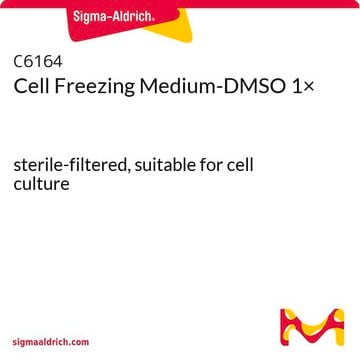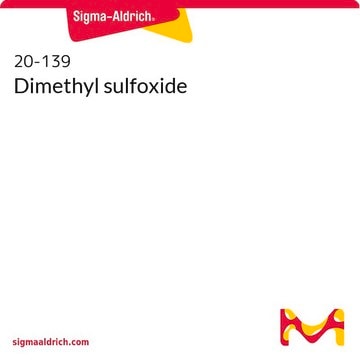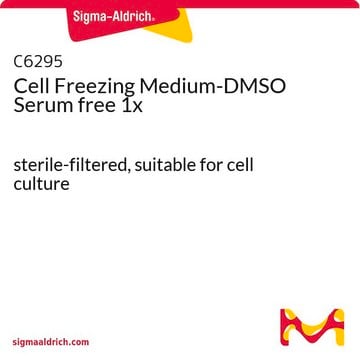This product is supplied as a neat or pure liquid with a density of 1.10 g/mL and a molecular weight of 78.13 g/mol. The minimum purity is 99.9%, thus the molarity will vary slightly from lot to lot. The molarity is 14.1 M.
D8418
Dimethyl sulfoxide
for molecular biology
Synonym(s):
Methyl Sulfoxide, Methylsulfinylmethane, Molecular Biology Grade DMSO, DMSO
Select a Size
Select a Size
About This Item
PCR: suitable
transfection: suitable
Recommended Products
grade
for molecular biology
Quality Level
vapor density
2.7 (vs air)
vapor pressure
0.42 mmHg ( 20 °C)
product line
BioReagent
Assay
≥99.9%
form
liquid
autoignition temp.
573 °F
shelf life
Recommended retest period - 2 years
expl. lim.
42 %, 63 °F
technique(s)
DNA sequencing: suitable
PCR: suitable
transfection: suitable
impurities
≤0.001 meq/g Titratable acid
≤0.1% water (Karl Fischer)
color
colorless
refractive index
n20/D 1.479 (lit.)
bp
189 °C (lit.)
mp
16-19 °C (lit.)
solubility
H2O: miscible (completely)
density
1.10 g/mL (lit.)
absorption
passes test
suitability
suitable for molecular biology
foreign activity
DNase and RNase, none detected
storage temp.
room temp
SMILES string
CS(C)=O
InChI
1S/C2H6OS/c1-4(2)3/h1-2H3
InChI key
IAZDPXIOMUYVGZ-UHFFFAOYSA-N
Looking for similar products? Visit Product Comparison Guide
General description
- Suitable for Molecular Applications
- Nuclease-Free DMSO
- DNase-Free, RNase-Free, Protease-Free, Phosphatase-Free
- Molecular Biology Grade DMSO
Dimethyl sulfoxide (DMSO) is a highly polar organic reagent that has exceptional solvent properties for organic and inorganic chemicals.
This product is designated as Molecular Biology grade and is suitable for molecular biology applications. It has been analyzed for the presence of nucleases and proteases.
Application
- polymerase chain reaction (PCR)
- amplification of cDNA libraries
- DNA sequencing
- column-loading buffers for poly(A)+ RNA selection
- buffers for the transformation of competent E. coli
- transfection protocols.
Dimethyl sulfoxide has been used-
- as an oligonucleotide solvent in array spotting[1]
- as a solvent during miRNA microarray analysis and quantitative real-time PCR (qRT-PCR)
- for cell lysis during MTT (3-(4,5-dimethylthiazol-2-yl)-2,5-diphenyltetrazolium bromide) assay
- for the preparation of the stock solution during MMP (mitochondrial membrane potential)cytofluorimetric assessment
- in the storage of human and animal cell lines and bacteriophage λ as a cryoprotective agent.
Features and Benefits
Caution
also commonly purchased with this product
related product
suggested gloves for splash protection
Storage Class Code
10 - Combustible liquids
WGK
WGK 1
Flash Point(F)
188.6 °F - closed cup
Flash Point(C)
87 °C - closed cup
Personal Protective Equipment
Regulatory Listings
Regulatory Listings are mainly provided for chemical products. Only limited information can be provided here for non-chemical products. No entry means none of the components are listed. It is the user’s obligation to ensure the safe and legal use of the product.
FSL
Group 4: Flammable liquids
Type 3 petroleums
Hazardous rank III
Water soluble liquid
ISHL Indicated Name
Substances Subject to be Indicated Names
ISHL Notified Names
Substances Subject to be Notified Names
JAN Code
D8418-37.5ML:
D8418-500ML:
D8418-100ML-C:
D8418-EW:
D8418-50ML-C:
D8418-1.5ML-C:
D8418-VAR:
D8418-50ML:4548173194936
D8418-5.5ML:4548173194929
D8418-5.5ML-C:
D8418-5.5ML-KC:
D8418-100ML:4548173194899
D8418-250ML:4548173194912
D8418-7.5ML:
D8418-1VL:4548173194905
D8418-1.5ML:4548173194882
D8418-1.5ML-KC:
D8418-1VL-KC:
D8418-BULK:
D8418-1ML-KC:
D8418-7.5ML-C:
D8418-250ML-C:
D8418-1L:
D8418-1ML:
D8418-1ML-C:
D8418-BULK-C:
Choose from one of the most recent versions:
Already Own This Product?
Find documentation for the products that you have recently purchased in the Document Library.
Customers Also Viewed
Articles
Transformation introduces exogenous DNA into cells, a fundamental genetic modification process demonstrated in Streptococcus pneumoniae.
SeqPlex™-I WTA kit amplifies RNA for NGS, enabling genomic studies from limited samples.
Protocols
Yeasts are considered model systems for eukaryotic studies as they exhibit fast growth and have dispersed cells.
Learn how to cultivate similar-sized iPSC-derived colon organoids using Millicell® Microwell plates and perform a forskolin-induced swelling assay.
A step-by-step protocol for released N-linked glycan analysis of the monoclonal antibody adalimumab, based on UHPLC-FLR-MS and procainamide labeling.
Related Content
KOD One™ PCR Master Mix overview for ultra-fast PCR with high specificity, fidelity, and yield
-
May I know the concentration (mg/ml) for DMSO (cat no. D8418)?
1 answer-
Helpful?
-
-
Is Product D8418, Dimethyl sulfoxide, also compatible with PET material?
1 answer-
Yes, Dimethyl sulfoxide (DMSO) is generally considered to be compatible with Polyethylene terephthalate (PET) material. The following information can be found on the Product Data Sheet:
-Compatible: LDPE, HDPE, polypropylene, PPCO (polypropylene copolymer), polymethylpentene, nylon, teflon FEP
-Moderately compatible: polystyrene, ECTFE/ETFE
-Incompatible: polysulfone, flexible and rigid PVC tubing, polycarbonatehttps://www.sigmaaldrich.com/deepweb/assets/sigmaaldrich/product/documents/944/265/d2650pis.pdf
Helpful?
-
-
Is this product sterile?
1 answer-
This product is not sterile. To prepare a sterile filtered DMSO solution, it is recommended to use a Teflon, polypropylene, or nylon membrane. See products D2650 or D2438 for sterile DMSO product options. Please review these products at the links provided below:
https://www.sigmaaldrich.com/product/sigma/d2650
https://www.sigmaaldrich.com/product/sigma/d2438Helpful?
-
-
What is the Department of Transportation shipping information for this product?
1 answer-
Transportation information can be found in Section 14 of the product's (M)SDS.To access the shipping information for this material, use the link on the product detail page for the product.
Helpful?
-
-
How does the storage temperature relate to shipping conditions?
1 answer-
The storage conditions that a Sigma-Aldrich catalog and label recommend for products are deliberately conservative. For many products, long-term storage at low temperatures will increase the time during which they are expected to remain in specification and therefore are labeled accordingly. Where short-term storage, shipping time frame, or exposure to conditions other than those recommended for long-term storage will not affect product quality, Sigma-Aldrich will ship at ambient temperature. The products sensitive to short-term exposure to conditions other than their recommended long-term storage are shipped on wet or dry ice. Ambient temperature shipping helps to control shipping costs for our customers. At any time, our customers can request wet- or dry-ice shipment, but the special handling is at customer expense if our product history indicates that the product is stable for regular shipment.
Helpful?
-
-
I received Product D8418, Dimethyl sulfoxide, as a frozen solid. But isn't it supposed to be in the liquid state?
1 answer-
DMSO super cools easily and remelts slowly at room temperature. The product may arrive as a solid instead of a liquid. The solidified product can be reliquified by warming to room temperature without detriment to the product.
Helpful?
-
-
What is the molarity of DMSO?
1 answer-
DMSO will have a molarity of 14.1M, based on a density of 1.1 g/mL and a molecular weight of 78.13 g/mol.
Helpful?
-
-
Is Product D8418, Dimethyl sulfoxide, assayed for DNase, RNase and protease?
1 answer-
Yes. It is a molecular biology grade product, and it is tested for DNase, RNase and protease. For a lot to pass none of those enzymes may be detected.
Helpful?
-
-
With what materials is Product D8418, Dimethyl sulfoxide, compatible?
1 answer-
The compatibility of DMSO with various materials is listed here: Compatible: LDPE, HDPE, polypropylene, PPCO (polypropylene copolymer), polymethylpentene, nylon, PTFE (Teflon) and FEP. Moderately compatible: polystyrene, ECTFE/ETFE. Incompatible: polysulfone, flexible and rigid PVC tubing, polycarbonate.
Helpful?
-
-
What is the DMSO dissolved in?
1 answer-
DMSO is not dissolved in any solvent. It is a pure chemical compound that is a liquid at room temperature.
Helpful?
-
Active Filters
Our team of scientists has experience in all areas of research including Life Science, Material Science, Chemical Synthesis, Chromatography, Analytical and many others.
Contact Technical Service




